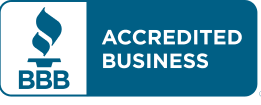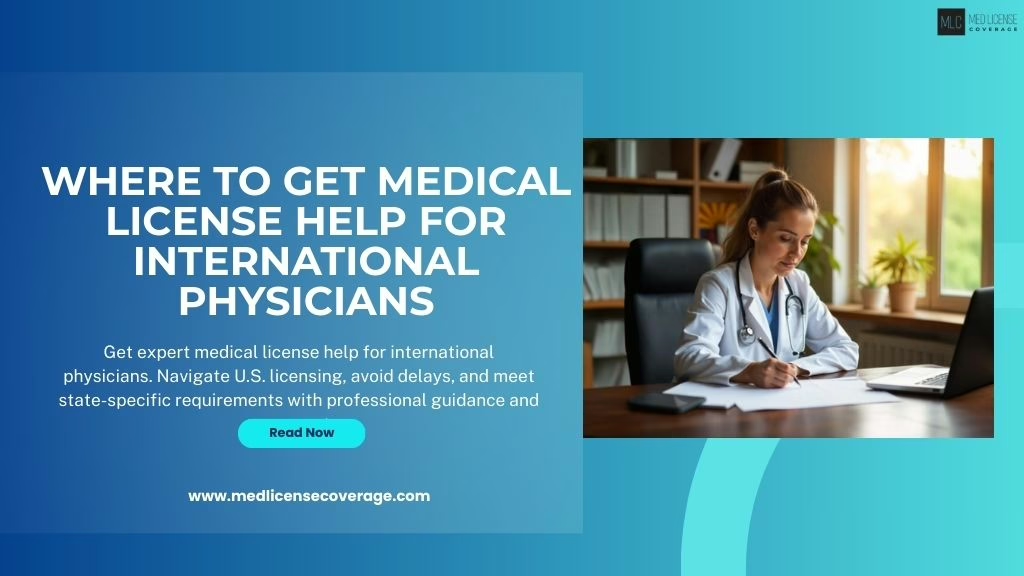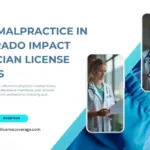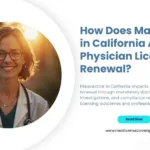Quick Summary
International physicians face complex licensing and credentialing approaches inside the U.S. This guide explores where to get professional medical license help, a way to avoid highly priced delays, and recommendations for navigating hospital credentialing across the nation with expert aid.
Introduction
Navigating the course to working towards medicinal drugs inside the United States entails numerous complex steps that require careful attention to detail. For international physicians, knowing the necessities and securing proper assistance is essential to avoid costly delays and frustration. A medical license helps ensure compliance with country felony guidelines and regulatory forums, minimizing errors and streamlining communication. The method demands careful attention to details, particularly while managing a scientific license utility or health facility credentialing by way of the state, which can vary significantly among jurisdictions and have an effect on timelines and consequences.
Understanding the Medical License Process
The U.S. strictly regulates medical licensure at the country level, with each scientific board enforcing its own regulations, bureaucracy, and documentation requirements. A valid license is essential earlier than undertaking medical practice, ensuring patient protection and expert standards. Obtaining a scientific license requires meeting educational qualifications, completing vital background assessments, verifying credentials, and might consist of additional necessities, including historical past checks. International physicians regularly face unique, demanding situations, which include verifying foreign medical levels, postgraduate education, and former licenses in a manner unexpected to many. Language barriers and variations in regulatory frameworks also add complexity. Such complexity makes obtaining a medical license an essential part of the process to ensure smooth navigation and prevent costly mistakes.

Key Steps in a Medical License Application
Each medical license application follows a detailed and regularly prolonged series that calls for careful control to meet closing dates and requirements. Understanding each part of the system helps maintain accuracy, improve performance, and avoid delays or denials. Important steps include file collection, together with instructional transcripts, diplomas, and exam ratings, which often require time-consuming coordination with overseas institutions.
Credential verification is needed for medical training, postgraduate training, and previous licensing through identified verification channels. Background assessments check criminal history, disciplinary actions, or malpractice claims. reference checks assess professional competence, while employment records need to be detailed and consistent. Every step inside the medical license application process calls for precision. Missing or incomplete documentation is not an unusual motive for delays. Medical license assistance simplifies these challenges and guarantees continuous progress with professional guidance.
Credentialing Challenges for International Physicians
Credentialing provides every other layer of complexity beyond licensure. Hospitals’ behavior is based on thorough evaluations of historical data before granting privileges to ensure patient safety and compliance with guidelines. Hospital credentialing by state varies significantly, with differences in documentation, timelines, and verification necessities. Credentialing covers important elements, which include board certification critiques, evidence of malpractice coverage, license validation, training statistics, and health documentation, like immunizations. Some states have more rigorous standards, while others may prioritize local graduates or impose additional requirements.
Hospital credentialing by state requires familiarity with each facility’s rules, techniques, and kingdom-unique requirements. Medical license help ensures files are submitted efficiently, follow hospital-specific checklists, and meet all deadlines, minimizing the risk of application rejection or delays.
Where to Access Medical License Help
Medical license help is widely available via specialized offerings, professional organizations, and institutional resources designed to assist for the duration of the licensing and credentialing journey. State medical boards serve as the primary regulatory government, dealing with licensure policies and application portals. Their valid websites frequently provide downloadable paperwork, precise checklists, and direct touch information for applicant assistance. The Federation of State Medical Boards (FSMB) allows kingdom boards to work collectively and oversees essential tools, like the Uniform Application (UA) and Federation Credentials Verification Service (FCVS), which make it less difficult to check credentials throughout specific states.
Hospital credentialing departments provide direct assistance by way of explaining the requirements for medical privileges and processing credential applications. Medical staffing businesses offer complete aid, which includes activity placement and licensure navigation. International Medical Graduate (IMG) help networks offer tailored assistance, combining academic steering with criminal recommendation and step-by-step licensing help.
State-Specific Variations in Licensing
State policies vary significantly across several key areas, necessitating careful evaluation and expertise before applying. Differences consist of necessary years of postgraduate schooling, ideal tests (which include USMLE or COMLEX), English proficiency testing, deadlines for application completion, and viable in-person interview requirements. For instance, Texas requires 3 years of ACGME-authorized education for international medical graduates, while Florida allows licensure with fewer years under certain conditions. California enforces strict reviews of overseas medical school recognition and educational credentials. These versions at once impact application strategy, timelines, and guidance.
Understanding these state-specific requirements is vital to avoid wasted time and assets. Medical license help provides updated insights and custom-designed plans aligned with each state’s particular standards to maximize the probabilities of success.
Importance of Timely Follow-Ups
After filing a medical license application, regular and proactive monitoring of the applicant is essential to prevent delays and keep the process moving smoothly. Third-party establishments, such as medical schools, examination boards, or teaching hospitals, can also delay responses, often unintentionally. State medical boards usually do not expedite application critiques unless prompted by consistent follow-ups. Medical license assistance offerings encompass proactive communication, often contacting third parties and forums to ensure timely responses and prompt resolution.
This ongoing tracking reduces processing instances and prevents applications from stalling. Efficient follow-up plays a vital role in successful licensure and credentialing, providing a structured technique for coping with complicated timelines and more than one stakeholder.
Digital tools support the process.
In 2025, digital platforms and software tools or platforms will drastically improve licensing speed, transparency, and accuracy. These tools assist candidates and aid teams in tracking submissions, updating credential statuses in real time, and scheduling required exams or renewals. Key systems include FSMB’s credentialing portals, NBME and ECFMG portals for managing exams and certifications, and state-specific licensing dashboards for each state that provide unique monitoring.
Credential Verification Organizations (CVOs) assist in automating and affirming applicant files securely and effectively. Bringing together these digital platforms with medical license help leads to fewer mistakes, quicker approvals, and usually a more realistic licensing process for doctors internationally. We are now in an era focused on quality efforts to reduce administrative burdens.
Common Mistakes in Licensing Applications
Many delays and application denials arise because of commonplace, yet avoidable, mistakes. Submitting old or incorrect paperwork, lacking required signatures, ignoring distinct checklist instructions, and supplying unverified translations often cause problems. Overlooking jurisdiction-unique criteria or failing to encompass obligatory files also results in rejection. Incomplete or inconsistent employment records and reference facts regularly trigger requests for additional documentation, prolonging the process.
Careful attention to detail during the preliminary submission is critical. Regularly reviewing application components against legitimate checklists and regulations ensures completeness. Medical license assistance services provide expert review and quality management to mitigate these risks, thereby increasing the likelihood of timely approval.
Final Documentation Requirements
After obtaining licensure approval, maintaining up-to-date documentation is crucial for legal operations. License renewals have to be completed within constant timelines, and continuing medical education (CME) hours should be carefully tracked and documented. Disclosure of any disciplinary actions or legal proceedings is obligatory to preserve belief and compliance.
Credentialing updates need to be submitted on every occasion of changing hospitals or practice places. Failure to keep documentation current can result in suspension or revocation of medical licenses and medical privileges. Medical license assistance services provide renewal reminders and documentation support and ensure compliance with evolving regulatory requirements. Long-term management supports continuous eligibility and fosters professional achievement.
Benefits of Professional Support
Accessing a dependable medical license assists and presents numerous benefits that greatly benefit international physicians. These offerings reduce the overwhelming administrative burden and complexity involved in licensure and credentialing. Professional assistance improves application accuracy, decreasing the risk of denials or audits that consume time and resources. It guarantees compliance with ever-changing state-unique necessities and regulatory requirements.
Additionally, medical license help saves time by managing conversations with more than one institution, tracking closing dates, and making ready files efficiently. For international physicians navigating multiple regulatory bodies and unexpected systems, structured guidance provides peace of mind and improves typical success rates, permitting focus on patient care and professional advancement.
Conclusion
Obtaining a medical license in the United States involves a multi-layered process with many particular requirements. International physicians need to complete complicated duties, from verifying overseas training and postgraduate schooling to meeting state-specific credentialing requirements. Before granting medical privileges, hospital credentialing by state adds an additional layer of scrutiny.
Medical license help offerings simplify this adventure by way of supplying guidance, document management, and follow-up support. Obtaining support from state boards, credentialing organizations, or expert offerings ensures the appropriate and timely fulfillment of each requirement. Following the right procedures and avoiding unusual errors improves approval times, allowing physicians to focus on delivering quality patient care and advancing their medical careers.
FAQs
1. What is Medical License Help?
Medical License Help involves professional help with completing applications, verifying credentials, and ensuring compliance with U.S. regulations. The goal is to guarantee prompt approval and adherence to the requirements of the state medical board.
2. How long is a medical license application?
The process varies by country; however, it typically takes 3 to 6 months. Delays often occur because of record verification or incomplete applications, which a medical license can help you with.
3. Why is hospital credentialing by state critical?
Credentialing ensures that physicians meet specific standards set by the state before they begin practicing. It verifies qualifications and history, protecting patients and meeting medical and regulatory compliance requirements.
4. Can worldwide physicians obtain medical license help?
Yes, specialized services assist international physicians in verifying overseas credentials, completing applications, and navigating complex state rules to streamline licensure and credentialing.
5. How does the digital age affect medical license help?
digital platforms enhance monitoring, submission accuracy, and communication with boards, reducing processing times and mistakes even as transparency grows throughout the licensing and credentialing process.
6. What common errors delay medical license applications?
Common delays stem from a lack of documents, outdated paperwork, incorrect required signatures, and failing to meet state-specific standards. Professional medical license assistance significantly reduces these errors.







